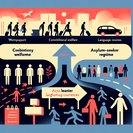
Germany’s drive to bring more international talent into its labour market took a technological leap on 20 November when the Federal Foreign Office and the Interior Ministry unveiled the next phase of their visa-digitalisation programme. After moving all long-stay (D) visa categories online earlier this year, the government will now integrate artificial-intelligence tools into case handling. The announcement, first flagged in an internal memo seen by mobility provider Crown World Mobility, says AI will pre-screen documents, detect fraud patterns and triage straightforward cases so that consular officers can focus on complex files.
Officials point to early pilots in Manila, Bengaluru and São Paulo where average processing times for ICT permits fell from 54 to 21 days while error rates dropped slightly. The government wants similar efficiency gains at Germany’s 167 visa sections worldwide—an urgent objective given chronic staff shortages in engineering, healthcare and IT. In 2024 Germany issued roughly 73,000 skilled-worker visas but still missed its annual recruitment target by almost 40 %. Business groups such as the BDI have long complained that red tape undermines the country’s competitiveness.
![Germany pilots AI-driven visa processing to speed up skilled-worker immigration]()
The AI layer will pull data from the Foreign Office’s Consular Services Portal and cross-reference it with labour-market checks performed by the Federal Employment Agency. According to interior-ministry sources, machine-learning models are trained only on anonymised data and will be audited twice a year by the Federal Data-Protection Commissioner. Applicants flagged by the algorithm for possible security or document issues will still undergo full human review.
For employers the biggest change is real-time visibility: HR teams will be able to upload contracts and see live status updates, a feature already available in Denmark and the Netherlands but lacking in Germany. The ministries expect a public beta of the AI functions in spring 2026 and full rollout by year-end. Until then, companies are advised to continue using the current digital portal and to submit complete documentation to avoid manual backlogs.
Practically, multinationals should prepare internal guidance for works councils and data-protection officers, as employee documents will flow through new processing pipelines. Early adopters can volunteer for the pilot phase via their local German mission. If the technology delivers as promised, Germany could close part of its 400,000-person skilled-labour gap without changing immigration quotas—a rare win-win for policy-makers and business.
Officials point to early pilots in Manila, Bengaluru and São Paulo where average processing times for ICT permits fell from 54 to 21 days while error rates dropped slightly. The government wants similar efficiency gains at Germany’s 167 visa sections worldwide—an urgent objective given chronic staff shortages in engineering, healthcare and IT. In 2024 Germany issued roughly 73,000 skilled-worker visas but still missed its annual recruitment target by almost 40 %. Business groups such as the BDI have long complained that red tape undermines the country’s competitiveness.

The AI layer will pull data from the Foreign Office’s Consular Services Portal and cross-reference it with labour-market checks performed by the Federal Employment Agency. According to interior-ministry sources, machine-learning models are trained only on anonymised data and will be audited twice a year by the Federal Data-Protection Commissioner. Applicants flagged by the algorithm for possible security or document issues will still undergo full human review.
For employers the biggest change is real-time visibility: HR teams will be able to upload contracts and see live status updates, a feature already available in Denmark and the Netherlands but lacking in Germany. The ministries expect a public beta of the AI functions in spring 2026 and full rollout by year-end. Until then, companies are advised to continue using the current digital portal and to submit complete documentation to avoid manual backlogs.
Practically, multinationals should prepare internal guidance for works councils and data-protection officers, as employee documents will flow through new processing pipelines. Early adopters can volunteer for the pilot phase via their local German mission. If the technology delivers as promised, Germany could close part of its 400,000-person skilled-labour gap without changing immigration quotas—a rare win-win for policy-makers and business.










